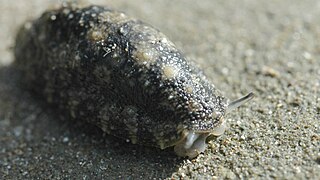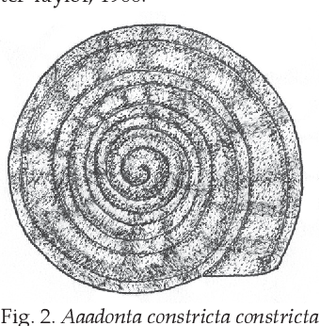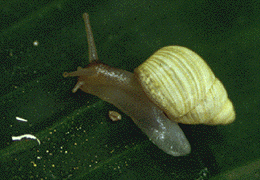Aaadonta angaurana is a small air-breathing land snail, a terrestrial pulmonate gastropod mollusc in the family Endodontidae.

Aaadonta is a genus of air-breathing land snails, terrestrial pulmonate gastropod mollusks in the family Endodontidae. Specimens from this genus are endemic to Palau.

Onchidiidae are a family of small, air-breathing sea slugs. They are shell-less marine pulmonate gastropod molluscs. Onchidiidae is the only family within the superfamily Onchidioidea.

Athoracophoridae, common name the leaf-veined slugs, are a family of air-breathing land slugs, terrestrial pulmonate gastropod mollusks in the infraorder Stylommatophora, the stalk-eyed snails and slugs. Many of the species have an attractive pattern on their dorsal surface which resembles the veins in a leaf, hence the common name.

Euglandina rosea, the rosy wolfsnail or cannibal snail, is a species of medium-sized to large predatory air-breathing land snail, a carnivorous terrestrial pulmonate gastropod mollusk in the family Spiraxidae.

Aaadonta constricta is a species of land snail, a terrestrial pulmonate gastropod mollusk in the family Endodontidae. It is endemic to Palau, where it is known from the islands of Babeldaob, Ngemelis, Peleliu and Koror. It may be extirpated from Koror. It is threatened by habitat destruction and modification.

Aaadonta fuscozonata is a species of air-breathing land snail, a terrestrial pulmonate gastropod mollusc in the family Endodontidae. This species is endemic to Palau, where it is known from Koror and Peleliu, and the small islands of Ngemelis and the northern Rock Islands. This snail inhabits tropical moist lowland forest, and is threatened by the destruction and modification of its habitat.
Aaadonta irregularis is a species of snail, a terrestrial pulmonate gastropod mollusk in the family Endodontidae. It is endemic to Palau, where it was only known from Peleliu, but has only been found recently on the very small island of Omekang. It is threatened by the destruction and modification of its tropical moist lowland forest habitat.
Aaadonta kinlochi is a species of snail, a terrestrial pulmonate gastropod mollusk in the family Endodontidae. It is endemic to Palau, where it was known from Angaur and Ulong Island. If it is still extant, it is threatened by the destruction and modification of its tropical moist lowland forest habitat.
Aaadonta pelewana is a species of snail, a terrestrial pulmonate gastropod mollusk in the family Endodontidae. It is found in Palau, where it was known from Peleliu and Koror. If it is still extant, it is threatened by the destruction and modification of its tropical moist lowland forest habitat.
Endodonta apiculata is a species of small air-breathing land snail, a terrestrial pulmonate gastropod mollusc in the family Endodontidae, an endemic family of land snails from the Hawaiian islands.

Partulidae is a family of air-breathing land snails, terrestrial gastropod mollusks in the superfamily Pupilloidea.
Zyzzyxdonta alata is a species of air-breathing land snail, a terrestrial pulmonate gastropod mollusk in the family Endodontidae.

Oreohelicidae is a family of small to medium-sized air-breathing land snails, terrestrial pulmonate gastropod mollusks in the superfamily Punctoidea.

The caudal mucous pit, or caudal mucous horn, is an anatomical structure on the tail end of the foot of various land snails and slugs, terrestrial pulmonate gastropod mollusks.

Libera is a genus of air-breathing land snails, terrestrial pulmonate gastropod mollusks in the family Endodontidae.

Notodiscus hookeri is a species of small air-breathing land snail, a terrestrial gastropod mollusk in the family Charopidae. This snail lives on islands in the sub-Antarctic region. Its shell is unique among land snails in that the organic shell layers contain no chitin.
Aaadonta fuscozonata depressa is a subspecies of land snail, a terrestrial pulmonate gastropod mollusk in the family Endodontidae. It is endemic to Palau, where it was only known from the tropical moist lowland forests of Peleliu. It is threatened by destruction and modification of its habitat.

Terrestrial molluscs or land molluscs (mollusks) are an ecological group that includes all molluscs that live on land in contrast to freshwater and marine molluscs. They probably first occurred in the Carboniferous, arising from freshwater ones.
Ba humbugi is the only species and therefore the type species in the genus Ba, a genus of land snail, belonging to the family Charopidae. Both the genus and the species were named by the American malacologist Alan Solem. The genus is endemic to the Fijian island of Viti Levu, and B. humbugi is an endangered species.











